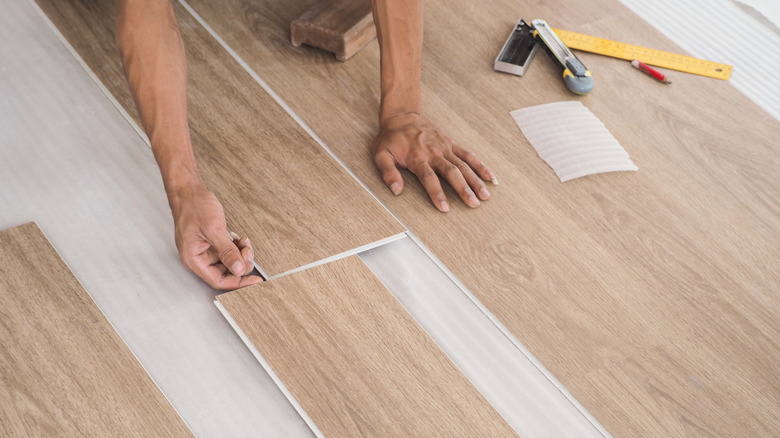The Popular Type Of Flooring Mike Holmes Doesn't Recommend For Kitchens
Deciding on the right flooring for your kitchen can be tricky, but Mike Holmes has some valuable tips. As an expert contractor and host of HGTV's "Holmes on Homes," he is an invaluable resource for renovations. If you're ready to re-do your kitchen floors, there are several materials to consider. The possibilities can seem overwhelming, but Holmes can help you cross off some options from your list. More specifically, there is one popular flooring type that Holmes is surprisingly against: vinyl.
Vinyl flooring has been one of the fastest-growing floor types since the 2010s, and it's not hard to guess why. This material is more affordable than other flooring options like tile, wood, or stone. Plus, it can mimic the appearance of these pricier finishes. However, Mike Holmes has a controversial opinion about its value. On his blog, he states, "Here are the cons of vinyl flooring and the reason I don't install vinyl flooring in kitchens. The mastics are prone to mold, and the manufacturing process is not environmentally friendly." Holmes also doesn't care for this flooring because it is "also not damage-resistant. Drop a couple of sharp objects on the floor and you will likely see dents." However, he clarifies that some higher-quality options are the most durable forms of vinyl flooring.
The hidden downsides and dangers of vinyl kitchen flooring
The possibility of mold and the lack of resilience aren't the only disadvantages of vinyl flooring you should be aware of. Holmes also notes that the manufacturing process is less than eco-friendly. Because it is made from polyvinyl chloride, the manufacturing method demands a high level of energy consumption. The material itself is derived from petroleum, and the flooring is not biodegradable. Just because it is inexpensive doesn't mean vinyl plank flooring is right for your space if it doesn't suit your principles. In addition to the environmental impact, Holmes writes that vinyl flooring can negatively impact your health. He explains, "Vinyl is basically made from PVC. That's why it is suspected of causing some health issues."
There are a few reasons for this, including the fact that new PVC-based vinyl flooring is known to produce fumes -– particularly within the first 10 days of installation. Another reason is that the presence of phthalates can leach into the food and water supply. A study published by the National Library of Medicine found that they are also endocrine disrupters, meaning phthalates can alter the functions of your hormonal or reproductive systems. Not all phthalates are bad, but many manufacturers fail to be transparent about the kind used in their products. If you want a better chance at sourcing non-toxic vinyl flooring, look for materials that have been submitted to the Resilient Floor Covering Institute and hold a safety certification.

